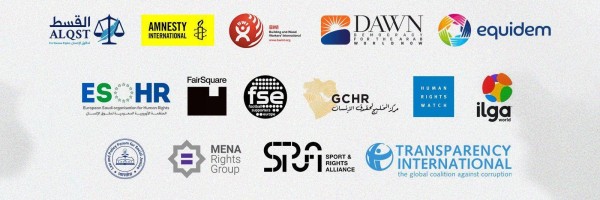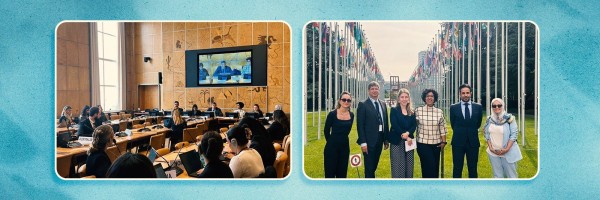Saudi Arabia – On international Human Rights Day, commit to these, eight specific human rights initiatives to end the human rights crisis
On 10 December 2018, international Human Rights Day, ALQST hosted a conference to assess the state of human rights in Saudi Arabia. Representatives from Amnesty International, European Saudi Organization for Human Rights (ESOHR), Gulf Center for Human Rights (GCHR), Human Rights Watch (HRW), International Federation for Human Rights (FIDH), MENA Rights Group and Reporters Without Borders (RSF) all took part, issuing the appeal below. Saudi Arabian academic, Hala al-Dosari and a representative of the United Kingdom-based Campaign Against Arms Trade (CAAT) also took part in the gathering.
Today, on Human Rights Day 2018, human rights organisations working on Saudi Arabia call on the authorities to take eight specific measures in order to improve the human rights situation in the country and in countries where they exercise influence:
1. Commit to freedom of expression, association and assembly
- End the harassment, prosecution and conviction of anyone for peacefully exercising their rights to freedom of expression, association or assembly;
- Release, immediately and unconditionally, all persons imprisoned solely for the peaceful exercise of these rights, such as human rights activists, including women’s rights defenders; lawyers; journalists; political activists, peaceful protesters and users of social media. Their imprisonment is considered arbitrary under international law and convictions on this basis must be quashed and there should be remedies available for all those arbitrarily detained;
- Repeal or substantially amend laws, including the Anti-Cyber Crime Law, to ensure that criticism of government policy and practice, and of officials, as well as other forms of protected speech by journalists, social media users and anyone who peacefully expresses a view, are not criminalised; and
- Repeal the Law on Associations and related legislation or substantially amend it to bring it into full conformity with international law and standards, and allow the formation of independent human rights organizations.
- Ensure that there is a recognised, criminal and legal basis for every arrest; that those arrested are aware of the basis for the arrest and are also able to challenge it before a judge, within 48 hours of the arrest; that detainees have access to family and legal representation of their own choice from within 24 hours of the arrest;
- Ensure that trials are conducted in line with international fair trial standards, including, inter alia, the right to prepare an effective defense and challenge the evidence and witnesses in a given case;
- Ensure a separation of powers; that the judiciary be independent;
- Release detainees whose sentences have expired and those who are held without charge; and
- Ensure that all persons are equal before the law, so that no one in a position of power enjoys immunity or impunity.
- Implement the 2016 recommendations of the Committee against Torture in respect to Saudi Arabia’s treaty obligations as a state party to the United Nations Convention against Torture, and publicise the steps taken[1];
- Put an end to the practice of incommunicado detention and ensure that every detainee has access to their family and a lawyer of their choice;
- Ensure that all allegations of torture and other ill-treatment are thoroughly, independently and impartially investigated and those suspected of criminal responsibility are brought to justice;
- Improve the management and oversight of prisons so that prisoners are treated humanely and their rights are respected. Ensure that all places of detention conform to the Mandela Rules (the UN Standard Minimum Rules for the Treatment of Prisoners); and
- Ensure that no statement obtained under coercion, including torture or other ill-treatment, is invoked as evidence in any proceedings, except against the person accused of torture as evidence that the statement was made; persons convicted on the basis of “confessions” extracted under torture or ill-treatment must be promptly re-tried in civilian courts in fair proceedings that exclude such statements, or released.
- Implement the 2018 recommendations of the Committee on the Elimination of Discrimination against Women in respect to Saudi Arabia’s treaty obligations as a state party to the United Nations Convention on the Elimination of All Forms of Discrimination against Women;[2]
- Ensure that women are able to take an active part in society and that laws and regulations protect women from domestic violence, oppression and marginalisation; and
- Abolish the male guardianship system and remove restrictions that prevent women’s equality with men before the law in the enjoyment of all human rights and ensure their active participation in society, including the rights to freedom of movement, education, employment, marriage and redress for violations.
- Immediately establish an official moratorium on executions with a view to abolishing the death penalty;
- Pending full abolition of the death penalty, stop using the death penalty and suspend pending death sentences;
- Stop using the death penalty against persons under the age of 18 at the time of the crime, in line with Saudi Arabia’s obligations under international law, notably as a party to the Convention on the Rights of the Child; and against any person having mental or intellectual disabilities; and
- Ensure that foreign nationals arrested, detained or imprisoned have adequate access to consular and interpretation services.
- Abolish the Specialised Criminal Court as it is fundamentally unfair and lacks internationally recognised standards of impartiality and judicial independence and repeal or substantially amend the Penal Law for Crimes of Terrorism and its Financing and the Anti-Cybercrime Law to ensure that the provisions adhere to international human rights law and standards;
- Explain publicly to the Saudi Arabian people how the government differentiates between the right to freedom of expression and terrorism, and
- Ensure that the definition of terrorism does not extend to include peaceful opposition, peaceful protesters or peaceful civic activism, and that countering terrorism is not used as an excuse to suppress fundamental liberties.
- Implement the 2016 recommendations of the Committee on the Elimination of Racial Discrimination in respect to Saudi Arabia’s treaty obligations as a state party to the United Nations Convention on the Elimination of Racial Discrimination, and publicise the steps taken;[3]
- Review the content of all primary and secondary educational curricula to ensure that it does not promote discrimination or serve to undermine human rights standards; and
- Prohibit advocacy of hatred that constitutes incitement to hostility, discrimination or violence on the basis of race, religion, sex, nationality or other discriminatory grounds.
- Fully comply with international humanitarian law in the planning and execution of any airstrikes, including to ensure civilians and civilian objects are not targeted and to end indiscriminate and disproportionate attacks harming civilians;
- Take all feasible measures to minimise harm to civilians, including giving advance effective warnings of impending attacks to civilian populations in affected areas;
- Ensure all humanitarian workers are granted freedom of movement and ensure the rapid and unimpeded delivery of impartial humanitarian relief for civilians in need, and lift arbitrary restrictions on commercial imports of essential goods;
- Cooperate fully with the investigation by the Group of Eminent Experts mandated by the UN Human Right Council to carry out a comprehensive examination of all alleged violations and abuses of international human rights and other appropriate and applicable fields of international law committed by all parties to the conflict in Yemen since September 2014; and
- Ensure independent, impartial investigations are conducted into allegations of war crimes, and that, where there is sufficient admissible evidence, those suspected of responsibility — including command responsibility — are prosecuted in fair trials.




